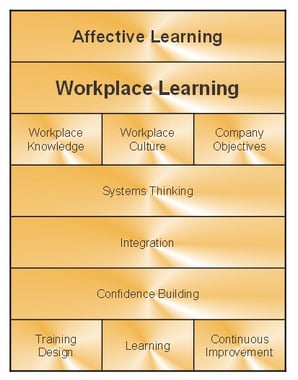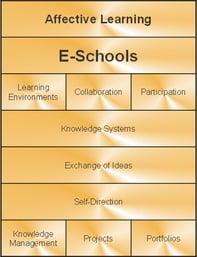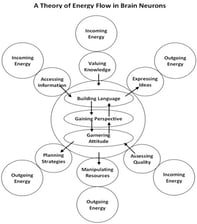Published on
Using Affective Learning Systems in the Workplace

Affective learning systems are social systems. As such they can be extremely useful for sharing knowledge and developing skills in the workplace. Frameworks described in previous articles are used to conceptualize training programs (Organizing Knowledge through Knowledge Management), describe the learning experiences within each program (Using Knowledge through Knowledge Management), and reflect the progress of training (Building Knowledge through Knowledge Management). Each learning experience is designed as a project. For example, learning experience frameworks could be created for each station on a manufacturing line. Learning experience frameworks could be created for the various accounting tasks in a business. The frameworks then become the templates for collaborative training in the workplace. The term worker is used in this article to mean everyone in the company including the CEO, owners, and board of directors (if one exists).
Workplace Knowledge
Frameworks are designed by experienced workers on site if the training is for new workers; and experienced workers can mentor new workers as they learn. Frameworks are designed by outside experts if the training is to introduce new learning to the workplace; and people will have to be brought in to facilitate new learning until workers are brought up to speed. Frameworks are dynamic and can be continuously improved and kept up-to-date. E-schools dispel the idea that workers own knowledge and make new learning and sharing knowledge a higher form of workplace security than ownership.
The use of frameworks can enhance the culture of the workplace through collaboration. The frameworks can be made accessible online as an e-school and become the reference benchmarks for continuous learning and consistency in manufacturing, services, business operations, as well as worker health and safety and social activities. An affective learning e-school can also be the foundation for problem solving and creativity within a company because it inherently builds a culture that demystifies learning and knowledge and allows every member of the organization to see knowledge as the engine which drives the company. E-learning schools have no boundaries, so they can be used by every branch of a company regardless of where they are located.
Company Objectives
Every company exists for a purpose. But as companies get larger, that purpose can get lost in the routine operations beyond the boardroom. The senior management of the company is then tasked to keep the company focused through all kinds of indirect measures. An affective learning e-school can enable all workers to appreciate the objectives of the company and understand how each and every worker is contributing to its vision.
Systems Thinking
Human beings understand complex ideas through systems thinking. Affective learning e-schools inherently enhance this potential. From a business perspective, workers will be able to see themselves as part of the company social system. They can understand the complex structures and interactions of all aspects of the company.
Integration
The most important aspect of any company is to motivate workers. Affective learning e-schools will allow all workers to have a big picture view of the company. They will be able to see how everything integrates and interacts as a dynamic multidimensional organization. It can remove adversarial relationships that reduce efficiency and effectiveness. Integration of knowledge will give everyone a sense of equality, respect and belonging that towers above any other form of compensation.
Confidence Building
A motivated company is a confident company. With Affective Learning Systems, employees are confident to express their learning wants and needs because all of them are conscious of what they don’t know as well as what they do know about the company. So it is not embarrassing or threatening not to know. It is just new knowledge that needs to be acquired and can be acquired through the company e-school.
Training Design
Training is designed using the knowledge management tools referenced above. This is done most effectively through focus groups, but can be done by individuals through research and by consulting experts in the area. An area of training is identified and a program framework is developed. Frameworks are also developed for each learning experience project in the program. It is possible to have small training programs which require only one project or larger programs that require many projects. A company would have different programs for each area of training.
Learning
Affective learning is done using the knowledge building template as a guide. Using the template not only gets the new learning done efficiently and effectively, but also inherently develops systematic thinking skills. As learners use the template more and more, the entire process becomes second nature. From my own experience, affective learning removes the fear of not being able to successfully learn or do something. It is important to understand that affective learning is not quick memory learning to be soon forgotten; but it is deep subconscious learning that stays forever.
Continuous Improvement
The whole issue of learning and knowledge in the information world is one of managing change. In today’s world, learning is never completed. Once we know something, it is soon modified or thrown out and replaced with something new. We cannot see knowledge as static anymore. Knowledge today is a dynamic “commodity”. So there must be continuous improvement. Affective learning e-schools reflect knowledge as the collective mental energy of the group who use them. There are no grades or diplomas. There is just a continuous thirst to keep the system and the users up-to-date.
Author Perspective: Business




